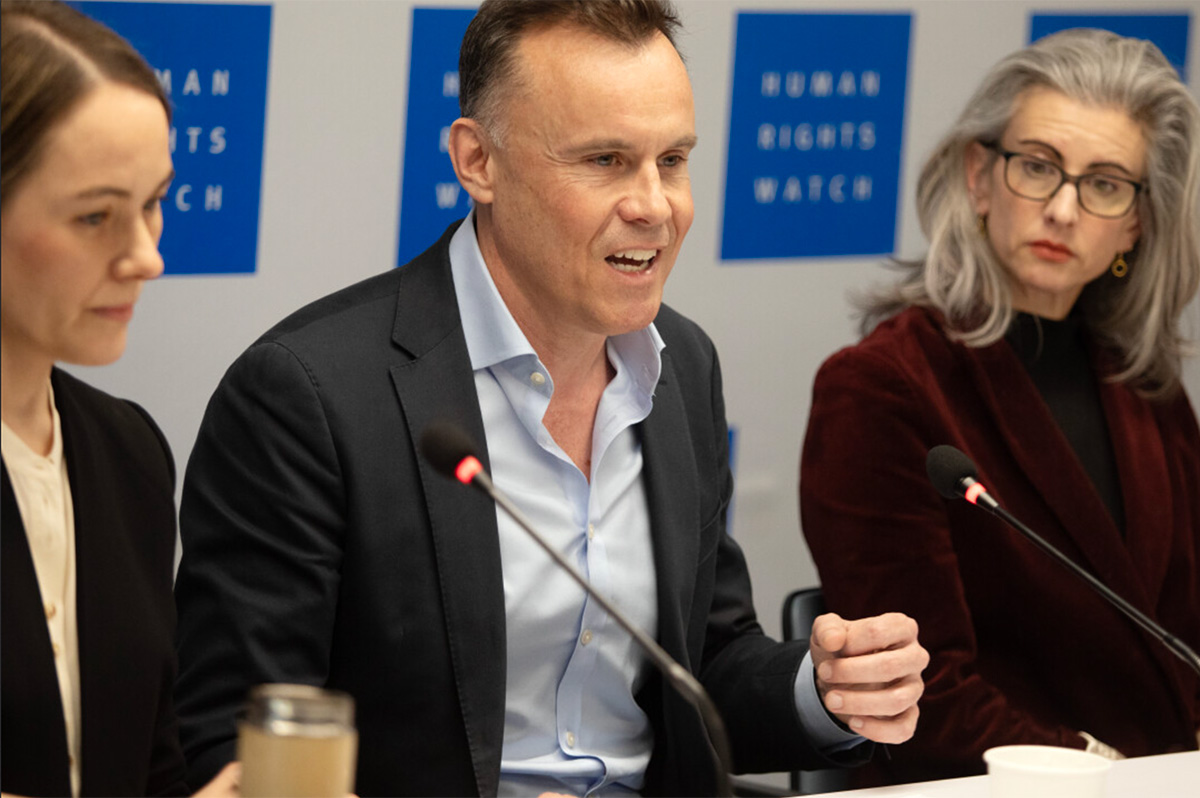National
Could 2010 be ‘Year of the Gay?’
Large number of out candidates running for office

David Cicilline, the gay mayor of Providence, R.I., is seeking a U.S. House seat in this year’s election. (Photo courtesy of Cicilline Committee)
The unprecedented number of LGBT candidates expected to seek political office this November could be setting up 2010 as the “Year of the Gay.”
A number of gay candidates are running for high-profile office this year. In addition to the three openly gay lawmakers in the U.S. House seeking re-election, several non-incumbent gay candidates are running for Congress.
Steve Pougnet, the gay mayor of Palm Springs, Calif., is seeking a House seat and David Cicilline, the gay mayor of Providence, R.I., is also running for Congress. Another gay candidate, Ed Potosnak, is running to represent New Jersey in the U.S. House. All three men are campaigning as Democrats.
Gay candidates are also seeking election to prominent statewide offices. In Massachusetts, Richard Tisei, a state senator, is in contention to become the Republican candidate for lieutenant governor. In Connecticut, Kevin Lembo, a health care advocate, is seeking the Democratic nomination to become lieutenant governor.
Additionally, several LGBT people are seeking election or re-election in races at the local level. Notable candidates include Kathy Webb, a lesbian who’s running for re-election to the Arkansas State House; Jolie Justus, a lesbian who’s running for re-election to the Missouri State Senate; and Heather Mizeur, a lesbian who’s running for re-election to the Maryland State House.
The Gay & Lesbian Victory Fund, which backs qualified LGBT candidates for political office, has endorsed for the November election 68 candidates for federal and local races. That’s the highest number of candidates the organization has ever endorsed at this point prior to a November election.
Denis Dison, a spokesperson for the organization, projected the Victory Fund will endorse at least 112 candidates by the time the general election arrives. It would be more candidates than the organization has ever endorsed for a general election.
“When people see someone like [lesbian] Annise Parker win election as mayor of Houston, they question their assumptions about what’s possible, and I think that when people see other LGBT candidates succeed, they believe they can they can do it, too,” Dison said.
The potential for the election of so many gay candidates to office could make 2010 a milestone in terms of visibility for LGBT officials. Such a change would echo a political phenomenon from 1992, which became known as the “Year of the Woman.” At the time, Democratic nominee Bill Clinton’s victory was accompanied by the election of four female Democrats to the U.S. Senate.
Three of those women still serve in the Senate today: Sens. Dianne Feinstein (D-Calif.), Barbara Boxer (D-Calif.) and Patty Murray (D-Wash.). Carol Moseley Braun, a presidential candidate in 2004, was also elected to represent Illinois in the U.S. Senate. Never before had four women been elected to the U.S. Senate in one election.
Dan Pinello, a gay government professor at the City University of New York, said the 1992 election’s outcome was the result of greater attention paid to feminist issues such as the Equal Rights Amendment and the Anita Hill hearings on Capitol Hill.
“Maybe the same thing is happening now in the LGBT community, given what’s occurred in the last decade or so around the issue, for example, of relationship recognition,” he said. “So there may be a correlation there in terms of there being events that spark attention to a particular community, and then, a decade or so later, it’s recognized enough to have members of that community be acknowledged publicly through election to public office in substantial numbers.”
Despite this potential for gay wins, Pinello said even if three LGBT non-incumbent candidates were elected to Congress, it wouldn’t yet proportionately reflect the LGBT population if, as some national exit polling data indicates, around 4 percent of American voters self-identify as lesbian or gay.
“Thus, in order to increase the openly lesbian and gay membership of Congress so that it would be comparable to the proportion of the population that is gay, you’d need about 18 more members, or an additional 600 percent,” he said.
Pinello was skeptical, though, whether wins for LGBT candidates seeking office in Congress this November should be considered substantial. He said a greater number of candidates would be necessary to make representation more closely reflect the American public.
“If there were like eight or 10 out there, and 435 total seats in the House, that would be notable,” he said. “That would be a dramatic shift, but I don’t know that anything short of that would be.”
Nonetheless, Pinello said every additional LGBT person elected to office would be a representational win, and called having known LGBT candidates running for office “a substantial statement.”
Noting the lack of LGBT representation in public offices throughout the country, Dison said LGBT people have a “long way to go” toward achieving representation in elected office, even if 2010 brings significant success.
“There are over half a million elected offices in the country and only 470 right now are filled with openly LGBT persons,” he said. “We’re still at the beginning of this effort to have our voices heard in government.”
But Dison said with so many LGBT candidates seeking office, 2010 could bring a surge in LGBT representation and predicted that a majority of Victory Fund-endorsed candidates would be successful in their races.
“Our win rate has fluctuated sort of between 65 and 75 percent over the last five years,” he said. “If that tradition holds, we’ll see roughly 70 percent.”
Michael Mitchell, executive director of the National Stonewall Democrats, said his organization intends to help LGBT candidates win election at the federal level as part of their overall plan to help Democrats win races this year.
“There are some great gay candidates out there — some who are already in, obviously, some who are running,” he said. “We are in the process of fine tuning our election plan and we’re going to be launching that very, very soon in the next couple weeks.”
Mitchell said he’s planning a coordinated campaign with an online presence intended to engage people across the country, using a model similar to what was used for the election of Parker as Houston mayor.
“We had folks from all across the country calling with Stonewall folks from Texas, and we were responsible for about 10,000 calls in one day,” Mitchell said. “We want to do similar things for the candidates that we are focused on, and I’m sure that some of those LGBT candidates will be included in our races.”
Dison said so many wins for LGBT candidates would benefit LGBT Americans because it would help ensure the community’s voice is heard.
“When people are able to speak from an authentic place as an LGBT person, it really changes the debate in the rooms where the decisions are made on things that affect our lives,” Dison said.
Puerto Rico
Bad Bunny shares Super Bowl stage with Ricky Martin, Lady Gaga
Puerto Rican activist celebrates half time show

Bad Bunny on Sunday shared the stage with Ricky Martin and Lady Gaga at the Super Bowl halftime show in Santa Clara, Calif.
Martin came out as gay in 2010. Gaga, who headlined the 2017 Super Bowl halftime show, is bisexual. Bad Bunny has championed LGBTQ rights in his native Puerto Rico and elsewhere.
“Not only was a sophisticated political statement, but it was a celebration of who we are as Puerto Ricans,” Pedro Julio Serrano, president of the LGBTQ+ Federation of Puerto Rico, told the Washington Blade on Monday. “That includes us as LGBTQ+ people by including a ground-breaking superstar and legend, Ricky Martin singing an anti-colonial anthem and showcasing Young Miko, an up-and-coming star at La Casita. And, of course, having queer icon Lady Gaga sing salsa was the cherry on the top.”
La Casita is a house that Bad Bunny included in his residency in San Juan, the Puerto Rican capital, last year. He recreated it during the halftime show.
“His performance brought us together as Puerto Ricans, as Latin Americans, as Americans (from the Americas) and as human beings,” said Serrano. “He embraced his own words by showcasing, through his performance, that the ‘only thing more powerful than hate is love.’”
National
Human Rights Watch sharply criticizes US in annual report
Trump-Vance administration ‘working to undermine … very idea of human rights’

Human Rights Watch Executive Director Philippe Bolopion on Wednesday sharply criticized the Trump-Vance administration over its foreign policy that includes opposition to LGBTQ rights.
“The U.S. used to actually be a government that was advancing the rights of LGBT people around the world and making sure that it was finding its way into resolutions, into U.N. documents,” he said in response to a question the Washington Blade asked during a press conference at Human Rights Watch’s D.C. offices. “Now we see the opposite movement.”
Human Rights Watch on Wednesday released its annual human rights report that is highly critical of the U.S., among other countries.
“Under relentless pressure from U.S. President Donald Trump, and persistently undermined by China and Russia, the rules-based international order is being crushed, threatening to take with it the architecture human rights defenders have come to rely on to advance norms and protect freedoms,” said Bolopion in its introductory paragraph. “To defy this trend, governments that still value human rights, alongside social movements, civil society, and international institutions, need to form a strategic alliance to push back.”

The report, among other things, specifically notes the U.S. Supreme Court’s Skrmetti decision that uphold a Tennessee law banning gender-affirming medical interventions for minors.
The Trump-Vance administration has withdrawn the U.S. from the U.N. LGBTI Core Group, a group of U.N. member states that have pledged to support LGBTQ and intersex rights, and the U.N. Human Rights Council. Bolopion in response to the Blade’s question during Wednesday’s press conference noted the U.S. has also voted against LGBTQ-inclusive U.N. resolutions.
Maria Sjödin, executive director of Outright International, a global LGBTQ and intersex advocacy group, in an op-ed the Blade published on Jan. 28 wrote the movement around the world since the Trump-Vance administration took office has lost more than $125 million in funding.
The U.S. Agency for International Development, which funded myriad LGBTQ and intersex organizations around the world, officially shut down on July 1, 2025. The Trump-Vance administration last month announced it will expand the global gag rule, which bans U.S. foreign aid for groups that support abortion and/or offer abortion-related services, to include organizations that promote “gender ideology.”
“LGBTQ rights are not just a casualty of the Trump foreign policy,” said Human Rights Watch Washington Director Sarah Yager during the press conference. “It is the intent of the Trump foreign policy.”
The report specifically notes Ugandan authorities since the enactment of the country’s Anti-Homosexuality Act in 2023, which punishes “‘carnal knowledge’ between people of the same gender” with up to life in prison, “have perpetrated widespread discrimination and violence against lesbian, gay, bisexual, and transgender (LGBT) people, their families, and their supporters.” It also highlights Russian authorities “continued to widely use the ‘gay propaganda’ ban” and prosecuted at least two people in 2025 for their alleged role in “‘involving’ people in the ‘international LGBT movement’” that the country’s Supreme Court has deemed an extremist organization.
The report indicates the Hungarian government “continued its attacks on and scapegoating of lesbian, gay, bisexual, and transgender (LGBT) people” in 2025, specifically noting its efforts to ban Budapest Pride that more than 100,000 people defied. The report also notes new provisions of Indonesia’s penal code that took effect on Jan. 2 “violate the rights of women, religious minorities, and lesbian, gay, bisexual, and transgender (LGBT) people, and undermine the rights to freedom of speech and association.”
“This includes the criminalization of all sex outside of marriage, effectively rendering adult consensual same-sex conduct a crime in Indonesia for the first time in the country’s history,” it states.
Bolopion at Wednesday’s press conference said women, people with disabilities, religious minorities, and other marginalized groups lose rights “when democracy is retreating.”
“It’s actually a really good example of how the global retreat from the U.S. as an actor that used to be very imperfectly — you know, with a lot of double standards — but used to be part of this global effort to advance rights and norms for everyone,” he said. “Now, not only has it retreated, which many people expected, but in fact, is now working against it, is working to undermine the system, is working to undermine, at times, the very idea of human rights.”
“That’s definitely something we are acutely aware of, and that we are pushing back,” he added.
Maryland
4th Circuit dismisses lawsuit against Montgomery County schools’ pronoun policy
Substitute teacher Kimberly Polk challenged regulation in 2024

A federal appeals court has ruled Montgomery County Public Schools did not violate a substitute teacher’s constitutional rights when it required her to use students’ preferred pronouns in the classroom.
The 4th U.S. Circuit Court of Appeals in a 2-1 decision it released on Jan. 28 ruled against Kimberly Polk.
The policy states that “all students have the right to be referred to by their identified name and/or pronoun.”
“School staff members should address students by the name and pronoun corresponding to the gender identity that is consistently asserted at school,” it reads. “Students are not required to change their permanent student records as described in the next section (e.g., obtain a court-ordered name and/or new birth certificate) as a prerequisite to being addressed by the name and pronoun that corresponds to their identified name. To the extent possible, and consistent with these guidelines, school personnel will make efforts to maintain the confidentiality of the student’s transgender status.”
The Washington Post reported Polk, who became a substitute teacher in Montgomery County in 2021, in November 2022 requested a “religious accommodation, claiming that the policy went against her ‘sincerely held religious beliefs,’ which are ‘based on her understanding of her Christian religion and the Holy Bible.’”
U.S. District Judge Deborah Boardman in January 2025 dismissed Polk’s lawsuit that she filed in federal court in Beltsville. Polk appealed the decision to the 4th Circuit.
-

 a&e features5 days ago
a&e features5 days agoMarc Shaiman reflects on musical success stories
-

 Television5 days ago
Television5 days agoNetflix’s ‘The Boyfriend’ is more than a dating show
-

 Movies5 days ago
Movies5 days ago50 years later, it’s still worth a return trip to ‘Grey Gardens’
-

 Opinions5 days ago
Opinions5 days agoSnow, ice, and politics: what is (and isn’t) happening


















